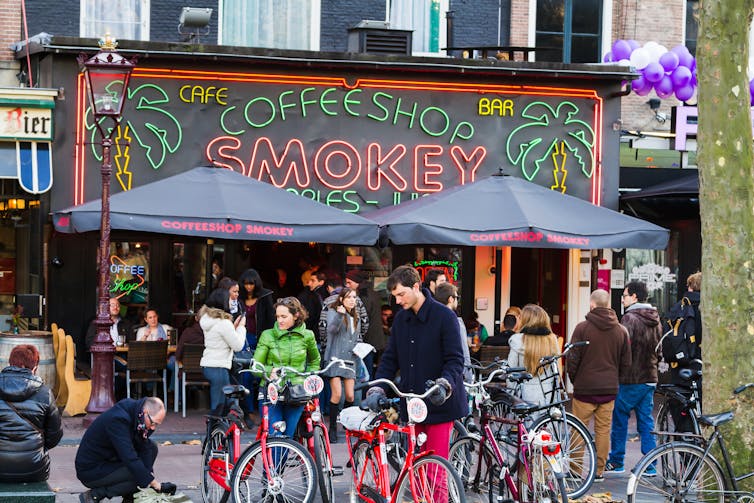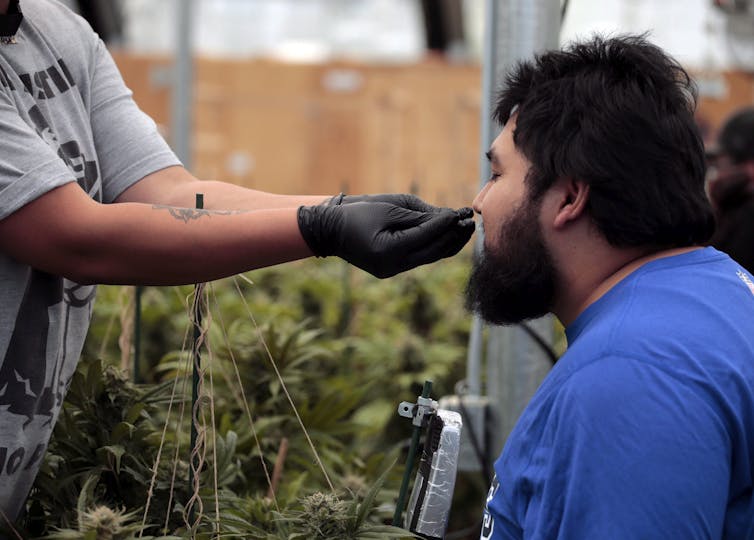Three years into the federal legalization of cannabis in Canada, almost all the pieces are in place for the growth of a robust cannabis tourism industry — except one.
Cannabis tourism includes the variety of activities, events and places that are part of any vacation or travel plans that incorporate cannabis. What’s missing are the rules around consuming cannabis socially in public settings, highlighting a broader issue about cannabis legalization in Canada.
My recent research on the cannabis industry suggests that integrating cannabis consumption into tourism will have positive social impacts toward normalization, acceptance and tolerance of cannabis.
From our partners:
Re-framing a once-demonized substance as a legitimate recreational resource, tourism can play an important role in challenging stigma.
What is cannabis tourism?
Similar to findings from the United States, preliminary Canadian market research around cannabis travel point to untapped economic opportunities for incorporating cannabis into travel experiences. This interest is likely to increase as attitudes become more open towards cannabis.
Cannabis tourism can include a variety of services and experiences, such as tour companies, booking platforms, cannabis friendly accommodations, lounges, bud-tending services, spas, consumer trade shows, specialty travel guides, retail locations, as well as events such as festivals, comedy shows and others.
In all of its forms, cannabis tourism is an educational platform for sharing different types of knowledge about growing the plant, understanding how cannabis interacts with the body, legally purchasing cannabis, the different product types available, the different ways to consume cannabis and the cultural context surrounding cannabis in different locations.

If the iconic coffee shops of Amsterdam have taught us anything it’s that the ability to purchase and consume cannabis in a lounge-type setting, without fear of reprimand by the authorities or judgement by the general public, attracts tourism.
READ MORE: THE WORLD’S MOST POPULAR TRAVEL DESTINATIONS
The ability to legally consume cannabis in public for social, recreational and leisure purposes offers timely opportunities for businesses in the tourism and hospitality industry hit hard by the pandemic.
Yet, a regulation gap has prevented the development of spaces in which people can responsibly consume cannabis products. In order for the cannabis tourism industry to move forward in a socially responsible and sustainable way, regulation is required in the area of cannabis consumption.
Closing the regulation gap
Closing the regulatory gap around cannabis consumption requires two things.
First, legislators must set aside outdated, uninformed and mistaken ideas that associate cannabis with deviancy and illegitimate behaviour. Education has a significant role to play changing perceptions.
Second, regulation around consumption must be thought of as an extension of the cannabis supply chain in Canada.
Similar to the legal production and sale of cannabis, spaces of public consumption can be regulated through licensing. Obtaining a license would enable a business to offer patrons the option of legally consuming cannabis on premises.

One level of hospitality licensing could include the on-site consumption of pre-packaged foods and beverages, which would allow an individual to purchase an edible at a café or lounge and consume it at the same establishment.
Another layer of licensing could address temporary events, such as concerts and festivals, with designated outdoor consumption areas for combustibles. Licensing also needs to address infused food and beverages prepared and served by restaurants.
A global leader in cannabis tourism?
Regulations are a great way to promote Canada as a safe destination to experience cannabis and entice the global travel audience. Beyond economic benefits, regulating cannabis consumption supports the government’s own objectives of reducing risk and supporting public health.
Most significantly, Canada is in a position to be a global leader in setting an international precedent for socially responsible and informed policy for an historically stigmatized and misunderstood substance.
But, a vibrant cannabis tourism industry in Canada is being held back by a lack of clear and meaningful rules. Regulations enabling public cannabis consumption will open up a new frontier for cannabis in Canada and, at the same time, push forward a socially responsible and progressive agenda for tourism that benefits tourists and citizens alike.
Susan Dupej, SSHRC Postdoctoral Research Fellow, Gordon E. Lang School of Business and Economics, University of Guelph
This article is republished from The Conversation under a Creative Commons license.
For enquiries, product placements, sponsorships, and collaborations, connect with us at hello@zedista.com. We'd love to hear from you!
Our humans need coffee too! Your support is highly appreciated, thank you!

